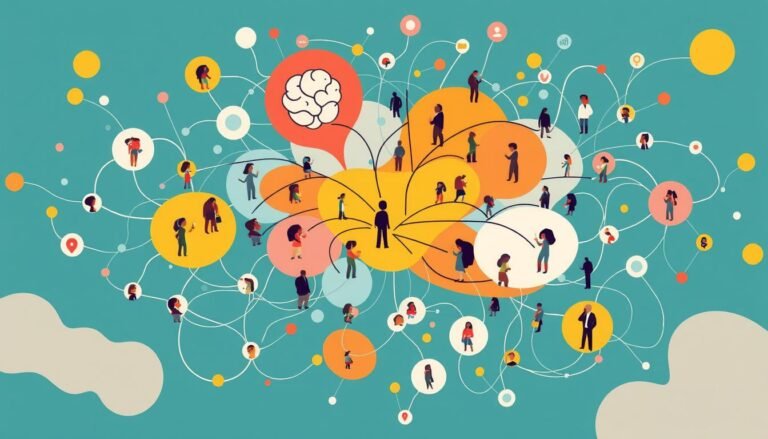Developing Talent: Ireland’s Skills Gap Solutions
Can Ireland bridge its skills gap as digital and automation demands grow?
Ireland is facing big challenges in getting its workforce ready for the changing job market. The OECD Ireland Skills Strategy Report highlights the need for more investment in lifelong learning. This fits with the European Year of Skills and the EU’s Digital Decade plan. They aim to make sure at least 80% of people have basic digital skills by 2023.
Employers are key in solving Ireland’s Skills Gap. They work with the government and schools to fix this issue. Skillnet Ireland, Learnovate, and Cisco are working together to improve digital and data skills. They’re doing this through workshops with Irish companies.
This €400,000 project, launched by Minister Simon Harris, is funded by Skillnet Ireland and Cisco’s Country Digital Acceleration Programme. It’s a big step towards solving Ireland’s skills problem.
Key Takeaways
- Skillnet Ireland, Learnovate, and Cisco are tackling Ireland’s digital and data skills shortage.
- A €400,000 project aims to create a unique national skills platform.
- The project includes a self-assessment tool to match skills with jobs, find gaps, and suggest learning paths.
- The European Year of Skills and EU’s Digital Decade plan aim for 80% of people to have basic digital skills by 2023.
- Working together between industry and government is key to solving digital skills issues and growing Ireland’s digital economy.
The Urgent Need for Lifelong Learning in Ireland
Technology and global changes are changing the job market fast. This makes lifelong learning in Ireland more important than ever. It’s key to keeping Ireland’s workers ready for the future. We’ll look at how Ireland is doing with lifelong learning, the challenges it faces, and how employers can help.
Current Participation Rates and Comparison with EU
Ireland’s lifelong learning rate is 14%, above the EU average. But, some countries do much better. This shows Ireland needs to improve its lifelong learning efforts to stay competitive. With more older workers, there’s a big need for ongoing learning to keep skills up to date.
Challenges in Lifelong Learning
There are big challenges to lifelong learning in Ireland. Skills gaps and unequal access to learning are major problems. Rising costs for energy and food are making life harder for people, slowing down spending. Jobs in some areas are dropping, so we need new strategies to move workers to growing fields like health care.
The Role of Employers in Promoting Lifelong Learning
Employers in Ireland are key to creating a culture that values learning. With technology changing jobs fast, it’s vital to keep workers’ skills sharp. Employers should focus on improving skills in thinking, social, emotional, and job-specific areas. This will help keep the workforce strong and ready for the future, thanks to support from programs like the European Social Fund Plus (ESF+).
To meet the need for lifelong learning in Ireland, we need to work together. This means getting people to learn more, employers to support learning, and the government to help out. By focusing on ongoing education and specific skills training, Ireland can build a workforce that’s ready for tomorrow.
Addressing the Automation Challenge in Ireland’s Workforce
The rise of automation is a big challenge for Ireland’s workers, especially in manufacturing and tech. Automation and robotics need workers to adapt and learn new skills. It’s vital to upskill the current and future workforce for an automated world.
The Impact of Automation on Various Sectors
Automation affects many industries:
- Manufacturing: It faces a shortage of skilled workers in areas like engineering and programming. Automation brings new skills that can open doors in other fields.
- Technology: In 2023, 76% of tech hiring managers in Ireland found it hard to find new talent. By 2024, 50% plan to grow their teams. This shows the need for continuous learning and upskilling.
- Workforce Aging: The manufacturing sector struggles with an aging workforce and few new recruits. Automation can attract younger people to the industry.
Strategies for Upskilling to Avoid Obsolescence
To deal with automation challenges, several strategies are being used:
- Collaboration Initiatives: Schools, government, and businesses are working together to create training that meets industry needs.
- Training Programs: Programs are being offered to teach workers how to use and maintain automated systems.
- Focused Upskilling: Training focuses on specific skills like robotics, AI, and advanced manufacturing.
| Metric | Percentage |
|---|---|
| Lack of Skilled Candidates in 2024 | 25% |
| Technology Hiring Managers with Tough Competition in 2023 | 76% |
| Hiring Managers Planning Team Expansion in 2024 | 50% |
| Tech Workers Considering New Opportunities in 2024 | 46% |
Strong upskilling efforts will be key to keeping Ireland’s workforce ready for the future. This will help ensure economic growth continues.
Public-Private Partnerships: Key to Bridging Ireland’s Skills Deficit
Public-Private Collaboration is key to solving Ireland’s Skills Deficit. The Spotlight on Skills program by Enterprise Ireland shows how well public and private groups can work together. This program helps companies set goals and fill skills gaps, bringing the government and private sector closer.
A great example is a €400,000 research project by The Learnovate Centre, Cisco, and Skillnet Ireland. It aims to create a national skills platform. This will help fix the digital skills gap and give people tools to check their skills.
- The platform includes a self-assessment tool for individuals to standardize digital skills required for various job roles.
- Workshops with Irish companies have highlighted a shortage of core digital and data skills, impacting the industry significantly.
The EU’s Digital Decade plan aims for at least 80% of people to have basic digital skills by 2023. This fits well with these strategies. Minister Simon Harris sees developing digital and data skills as key for Ireland’s economy. Cisco and Skillnet Ireland explain how the platform will help fix the skills shortage and change how upskilling is done.
IDA Ireland believes in investing in new ways to help people improve their skills and careers. This supports Ireland’s society and economy. Public-Private Collaboration is about more than just money. It’s about making a place where learning and growth are a top priority, preparing the workforce for the future.
The tech industry in Ireland is facing a big talent shortage. This includes roles like software developers, cybersecurity experts, and data analysts. By 2024, this could slow down tech companies’ growth, hurting innovation and the economy. So, improving STEM education, encouraging tech careers, and supporting lifelong learning are key strategies.
Public-Private Partnerships are vital for solving Ireland’s Skills Deficit. They bring together the government, schools, and the tech industry. With these partnerships, Ireland can create strong plans to improve its workforce, boost innovation, and support long-term economic growth.
Developing Talent for the Future: Ireland’s Skills Gap
Ireland is working hard to meet the growing need for skilled workers, especially in STEM fields. With a predicted 8% increase in STEM jobs by 2025, it’s crucial to develop skills strategically.
Research Initiatives and their Role
Efforts to boost STEM education are led by various research partnerships. Learnovate, with Cisco and Skillnet Ireland, is investing €400,000 in a national skills platform. This platform helps with self-assessment, standardizing skills, and planning careers. It aims to draw global talent to Ireland and meet the STEM skill needs.
Case Study: Learnovate’s National Skills Platform
The project by Learnovate with Cisco and Skillnet Ireland shows how focused research can make a big difference. The National Skills Platform, with a big investment, aims to close the skills gap. It offers tools for self-assessment and mapping skills. This project helps Ireland stay competitive globally and prepares the workforce for future challenges.
The government is also backing STEM education with at least €150 million in the 2024 budget. This funding is vital to meet the industry’s demand. The Science Foundation Ireland report says Ireland needs 4,800 more STEM graduates each year.
With these efforts and a strategic plan, Ireland is working to fill the skills gap. It aims to be a top destination for global talent, ensuring it stays competitive in workforce development.
Strengthening Industry-Academia Collaboration
The partnership between industry and academia is key to solving Ireland’s skills gap. It brings real-world experiences into the classroom and gives students a direct route to jobs in important fields. This teamwork aims to improve STEM education and get students ready for the changing job market.
Examples of Successful Collaborations
Cisco has teamed up with leading Irish universities to make IT education more relevant. Skillnet Ireland connects businesses with the talent they need to fill skill gaps. Learnovate at Trinity College Dublin is working on educational technologies, creating innovations that help students and employers.
These partnerships show how combining education with industry can lead to big changes. They bridge the gap between what students learn and what employers need.
Benefits for Students and Employers
Industry-Academia Collaboration has many advantages. Students get to tackle real-world problems, making them more job-ready. Employers find talented people who know the latest in their field. This approach also boosts STEM education, ensuring a steady supply of skilled graduates.
These partnerships are a spark for innovation. They improve both what’s taught in schools and what’s expected in the workplace.
| Collaboration | Contribution | Outcome |
|---|---|---|
| Cisco & Irish Universities | IT education enhancement | Real-world application integration |
| Skillnet Ireland | Business-Talent connectivity | Addressing skill shortages |
| Learnovate at Trinity College Dublin | Educational tech innovation | Fostering research and practical solutions |
Promoting STEM Education to Future-Proof Ireland’s Workforce
Promoting STEM education is key to Ireland’s tech and economic future. We need to spread the word on why STEM matters. This is because diverse teams can solve complex problems and come up with new ideas. Right now, only about a quarter of STEM jobs in Ireland are held by women. This shows we must work on getting more women into these fields.
Enterprise Ireland says we need flexible funding and program designs to meet future skills needs. They suggest Micro Credentials and Recognition of Prior Learning can help. Their 2022-2024 Strategy focuses on making STEM more diverse and open to everyone. This includes getting more women into STEM and helping those who are less privileged get into education.
We also need to keep STEM education staff up to date with new skills and tech. Career guidance is key to help learners move forward in their careers. A system that links Further and Higher Education is being proposed. This shows how important STEM Education Promotion is.
Mentorship programs and seeing women in STEM roles can motivate and empower them. Companies with diverse teams do better financially and are stronger. We all need to work together to fix the gender gap in STEM. This means fighting gender stereotypes and biases to make STEM more welcoming for everyone.
Giving women more chances to do internships and get work experience in STEM can really help. We need to make people understand why having more women in STEM is important. This will help improve Apprenticeship Programs Enhancement and Retaining Skilled Workers in Ireland.
Supporting STEM Education Promotion can create a culture that grows talent and fills Ireland’s skills gap. We need the right infrastructure and tech for STEM education. Looking ahead and planning for future STEM skills is crucial for a strong workforce.
| Aspect | Current Status | Future Goals |
|---|---|---|
| Gender Diversity in STEM Roles | 25% women | Increase female participation |
| Female IT Specialists | 1 in 6 | Equal opportunities |
| Female STEM Graduates | 1 in 3 | Enhance education and training |
| Workforce Performance | Better with diversity | Promote diversity and inclusion |
Conclusion
To fix Ireland’s skills gap, we need a complete plan. This plan should include lifelong learning, embracing automation, and working together with the private sector. These steps will help Future-Proof Ireland’s Talent Pool.
Ireland is short on engineers, project managers, technicians, and energy analysts. This is especially true in renewable energy, where there are many jobs in designing wind farms, making advanced battery storage, and working on high-voltage electrical systems.
Green Tech Skillnet is working hard to fill this gap by making sure education meets industry needs. By getting industries involved in education, we can make sure training is useful, up-to-date, and prepares students for the future. This is key to building a strong, local talent pool.
Programs like the Learnovate National Skills Platform show how important it is to match what we learn with what the job market needs. Working together between companies and schools, like the MSc in Human Resource Management at University College Dublin, is also crucial. It helps keep skilled workers in Ireland and prepares them for the future.
By taking these steps, Ireland is on track to solve its skills gap. This will boost its position in the global economy.
Source Links
- National skills platform will help close Ireland’s digital skills gap
- Unique national skills platform will help close Ireland’s digital skills gap
- OECD Skills Strategy Ireland
- A Review of the European Year of Skills – abodoo
- Embracing Robotics and Automation: Bridging the Skills Gap in Irish Manufacturing – Irish Manufacturing
- Skills Shortage impacting Technology Growth in Ireland
- Unique national skills platform will help close Ireland’s digital skills gap
- Cyber Security Jobs: Why Ireland is Facing a Skill Shortage · Future Horizons
- Tech Talent Shortage Ireland 2024
- Bridging the Gap: Unveiling Ireland’s STEM Skills Shortage
- Automation, AI, and Future Skills Needs: An Irish Perspective
- IOP Solving Skills One Year On: Partnerships powering apprenticeships
- Empowering Women in STEM for Ireland’s Future
- Addressing the Skills Shortage in Ireland’s Renewable Energy Sector – Industry Involvement Needed
- Third Report of the Expert Group on Future Skills Needs
- What are the best practices for talent management in Ireland?








